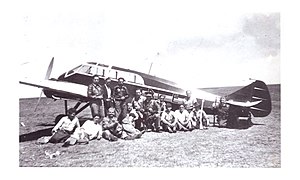General Aircraft Monospar ST-25
The General Aircraft Monospar ST-25 was a British 1930s light twin-engined utility aircraft.
| Monospar ST-25 | |
|---|---|
 Monospar ST-25 Jubilee of Eloy Fernández Navamuel during the Spanish Civil War[1] | |
| General information | |
| National origin | United Kingdom |
| Manufacturer | General Aircraft Ltd, Hanworth |
| Number built | 60 |
| History | |
| Manufactured | 1935–1939 |
| First flight | 19 June 1935 |
| Developed from | General Aircraft Monospar ST-10 |
Design and development
editThe Monospar ST-25 was a low-wing cantilever monoplane with a fabric-covered metal structure. The monospar name came from the use of a single spar in the wing structure, that had been developed by H J Stieger. The cabin was enclosed with five seats. It was based on the GAL Monospar ST-10, with the addition of a folding seat for a fifth passenger, extra side windows, and the addition of a radio receiver. On 19 June 1935, the prototype (G-ADIV) made its first flight at Hanworth Air Park. It was designated Monospar ST-25 Jubilee, to honour the 25th anniversary of the reign of King George V.[2]
Operational history
edit- The last flying Monospar ST-25 (ZK-AFF), of Piet Van Asch, the owner of New Zealand Aerial Mapping Ltd, was lost in 1986 in a hangar fire.[3]
- The last surviving Monospar ST-25 (OY-DAZ), an ST-25 Ambulance, was fully restored during 1989–1999, and is now displayed in Egeskov Veteranmuseum at Egeskov Castle, Denmark.[4]
Variants
edit- Monospar ST-25 Jubilee
- (1935-1936) Single fin and rudder. 30 built.[2]
- Monospar ST-25 De Luxe
- One Monospar ST-25 Jubilee with a large single fin and two Niagara II engines, later converted to the prototype Monospar ST-25 Universal, with twin fins.[2]
- Monospar ST-25 Ambulance
- Variants of both Monospar ST-25 Jubilee and ST-25 Universal, with a large door on the starboard side to allow a stretcher to be loaded.[2]
- Monospar ST-25 Universal
- (1936-1939) Twin fin and twin rudder. 29 built, including the conversion of the De Luxe.[2]
- Monospar ST-25 Freighter
- A variant of the Monospar ST-25 Universal, with a large freight door but without the passenger seating.[2]
- GAL.26
- One modified Monospar ST-25 Jubilee, fitted with two Cirrus Minor I engines in 1936.[2]
- GAL.41
- One experimental aircraft based on the Monospar ST-25 Universal. A new fuselage was built containing a pressurized section with two seats. Its purpose was to test possible pressurization systems for a proposed airliner, the GAL.40.[5][a] The GAL.41 flew for the first time on 11 May 1939,[7] and was grounded in 1941.[8]
Operators
edit- Adelaide Airways/Australian National Airways[9]
- Airlines WA[9]
- Eastern Canada Air Lines (five ST-25 Freighters, delivered in 1936)[9]
- Maritime Airways[9]
- Zone-Redningskorpset - 1 ambulance version[9]
- ES-AXY "Vahur", in the service of the Ministry of Transport and Communications[10]
- Armée de l'Air (2 ST-25 in Indochine (Vietnam) in November 1945)[11]
- Van Melle's Confectionery Works, Breskens (one Jubilee, PH-IPM "Dubbele Arend", delivered in 1935)[12]
- New Zealand Aerial Mapping
- Royal New Zealand Air Force
- General Command of Mapping (Turkey)
- Turkish Government (two ST-25 Freighters for parachute training delivered in 1937)
- Crilly Airways[13]
- Utility Airways[14]
- Royal Aircraft Establishment (two Jubilees used for radio development)
- Royal Air Force (impressed civil aircraft used during the second world war)
Specifications (Monospar ST-25 Jubilee)
editData from Jackson, 1973
General characteristics
- Crew: one
- Length: 26 ft 4 in (8.03 m)
- Wingspan: 40 ft 2 in (12.24 m)
- Height: 7 ft 10 in (2.39 m)
- Wing area: 217 sq ft (20.2 m2)
- Empty weight: 1,680 lb (762 kg)
- Gross weight: 2,875 lb (1,304 kg)
- Powerplant: 2 × Pobjoy Niagara II 7-cyl. air-cooled radial piston engine, 90 hp (67 kW) each
Performance
- Maximum speed: 142 mph (229 km/h, 123 kn)
- Range: 585 mi (941 km, 508 nmi)
- Service ceiling: 16,000 ft (4,900 m)
- Rate of climb: 800 ft/min (4.1 m/s)
See also
editReferences
editNotes
edit- ^ The Fairey FC1 was selected to meet the requirement for the airliner.[6]
Citations
edit- ^ Howson, 1990
- ^ a b c d e f g Jackson 1973, pp. 215–220
- ^ PIET VAN ASCH – New Zealand's Aerial Mapping Pioneer at wings.net.nz Archived 9 February 2013 at the Wayback Machine
- ^ Ogden (2009)
- ^ Jarrett 1990, pp. 734–736
- ^ Jarrett 1990, p. 735
- ^ Jarrett 1990, p. 736
- ^ General Aircraft Monopar ST-25 – British Aircraft of World War II accessed 1 July 2017]
- ^ a b c d e f Stroud 1988, p. 238
- ^ Estonian National Archives Photo Database, EFA.446.0.194553
- ^ "Les Nakajima Ki-43 " Oscar " dans l'Armée de l'Air, une fausse bonne idée" (in French). 21 February 2016.
- ^ "Rond vliegveld" (in Dutch). Archived from the original on 25 February 2014.
- ^ Stroud 1988, p. 237
- ^ Stroud 1988, pp. 237–238
Bibliography
edit- Howson, Gerald. 1990. Aircraft of the Spanish Civil War 1936–39. Putnam ISBN 978-0-85177-842-6
- Jackson, A.J. (1973). British Civil Aircraft since 1919, Volume 2. Putnam. pp. 215–220, 519–521 ISBN 0-370-10010-7
- Jarrett, Philip (December 1990). "Nothing Ventured...No 9". Aeroplane Monthly. Vol. 18, no. 12. pp. 734–737, 775. ISSN 0143-7240.
- Lumsden, Alec; Heffernan, Terry (February 1984). "Probe Probare No 2: Monospar ST-25". Aeroplane Monthly. Vol. 12, no. 2. pp. 94–96. ISSN 0143-7240.
- Ogden, Bob (2009). Aviation Museums and Collections of Mainland Europe. Air-Britain. ISBN 978-0-85130-418-2
- Stroud, John (April 1988). "Wings of Peace". Aeroplane Monthly. Vol. 16, no. 4. pp. 232–238. ISSN 0143-7240.
- Wright, Matthew (1991). "Mapping by Monospar". Air Enthusiast. No. 44. pp. 6–9. ISSN 0143-5450.